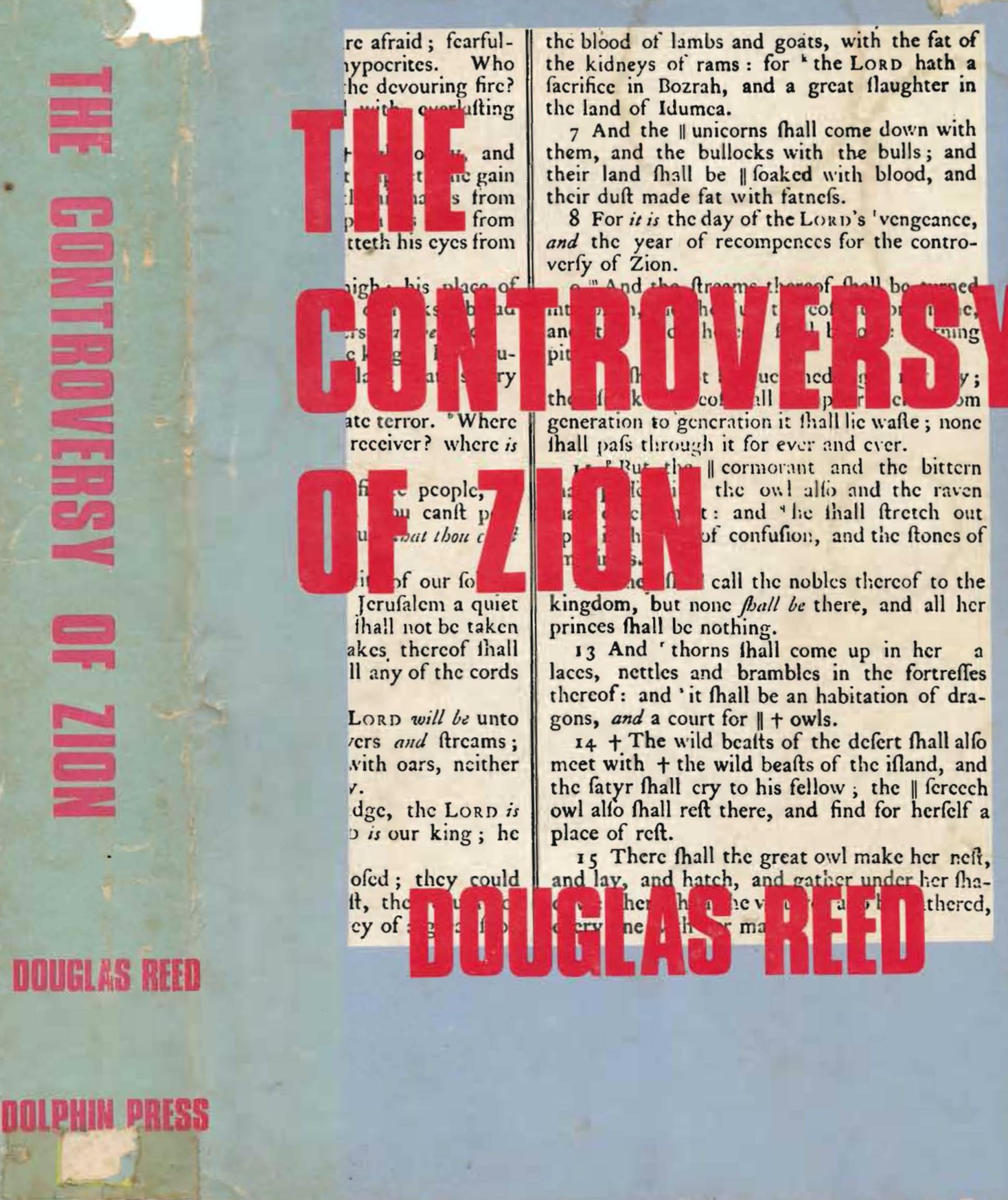Douglas Reed
The Controversy of Zion (1978)

It is one of the commonplaces of history that adverse circumstances offer no obstacle to men of outstanding energy and ability. Douglas Reed, who described himself as "relatively unschooled", started out in life as an office boy at the age of thirteen and he was a bank clerk at nineteen before enlisting at the outbreak of World War I. A less promising preparation for a man destined to be one of the most brilliant political analysts and descriptive writers of the century could hardly be imagined. He was already 26 years old when he reached the London Times in 1921 as a telephonist and clerk; and he was 30 when he finally reached journalism as sub-editor. Three years later he became assistant Times corespondent in Berlin before moving on to Vienna as Chief Central European corespondent. Reed broke with the Times in October 1943, near the time of the appearance of a book which was to win him instant world fame: INSANITY FAIR, a charming combination of autobiography and contemporary history. This was followed by more best sellers in quick succession. Commencing in 1951, Douglas Reed spent more than three years writing THE CONTROVERSY OF ZION - all 300,000 words of it. He completed the epilogue in 1956. Although there is correspondence to show that the book was once discussed with his publisher, the manuscript was never submitted, but remained for 22 years stowed away in Reed's home in Durban, South Africa. The question remains. Why?
The Controversy of Zion was written by Douglas Reed when at the peak of his writing career. It is the product of more than three years of full-time research, much of it carried out at the New York Central Library, and drawing on sources not easily accessible. He combines with information acquired in this way all the background knowledge and experience of a former London Times foreign correspondent who observed political developments in Europe at close range
over a number of years.
The book is written in a tone of sympathetic understanding of the situation in which millions of Jews have found themselves down the centuries, and he explores at depth (drawing much of his material from authoritative Jewish sources) central moral issues over which the Jews themselves have frequently been deeply divided and which have always involved the possibility of dangerous alienation from the main stream of mankind.
Many will find that the real issue which set up violent antagonism between the Founder of Christianity and the Pharisees has been made clear by Reed, with quotations from Biblical and Talmudic sources, reinforced with others supplied by Jewish scholars, both ancient and modern. Religious information and interpretation acquire an extra dimension of interest and importance when set in proper relationship with historical developments from before the Babylonian Captivity until modern times. For Reed shows once again how news of contemporary political happenings, which many people have given up trying to understand, can be rendered instantly intelligible when presented in the total historical context to which they belong.
Much of the revisionist historY to be found in modern conservative literature, like that deali~gwith the Alger Hiss trial, the persecution of Senator Joseph McCarthy, the Yalta Agreement, the Nuremberg Trials, the Morgenthau Plan, etc. has been amplified and illuminated and fitted into the grand mosaic of more than 2 000 years of human striving and suffering.
About the Author
The disappearance into almost total oblivion of Douglas Reed and all his works was a change that could not have been wrought by time alone; indeed, the correctness of his interpretation of the unfolding history of the times found some confirmation in what happened to him when at the height of his powers. After 1951, with the publication of Far and Wide, in which he set the history of the United States of America into the context of all he had learned in Europe of the politics of the world, Reed found himself banished from the bookstands, all publishers’ doors closed to him, and those books already published liable to be withdrawn from library shelves and “lost”, never to be replaced. His public career as a writer now apparently at an end, Reed was at last free to undertake a great task for which all that had gone before was but a kind of preparation and education that no university could provide and which only the fortunate and gifted few could fully use - his years as a foreign correspondent, his travels in Europe and America, his conversations and contacts with the great political leaders of his day, plus his eager absorption through reading and observation of all that was best in European culture. Experiences which other men might have accepted as defeat, served only to focus Douglas Reed’s powers on what was to be his most important undertaking - that of researching and retelling the story of the last 2000 years and more in such a way as to render intelligible much of modern history which for the masses remains in our time steeped in darkness and closely guarded by the terrors of an invisible system of censorship.
Downloads and Links
- Download The Controversy of Zion (1978) by Douglas Reed - PDF (64 MB) - 599 pages.
- Download Controversy of Zion (2004) by Douglass Reed - PDF (4.1 MB) - 395 pages.
- Listen to/Download The Controversy of Zion (1978) by Douglas Reed - Audiobook
- Web search for the book by ISBN:9781910220030
- Web search for the book by author and title
